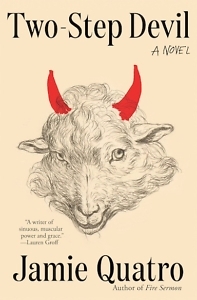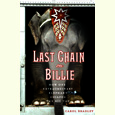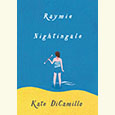A Man of the Book
Novelist Jamie Quatro plumbs the desires of body and soul in Two-Step Devil
Lookout Mountain dominates the landscape of TAG, the intersection of Tennessee, Alabama, and Georgia, coursing through all three states before tapering to its prominent point, like the bow of an ocean liner, above my hometown of Chattanooga.

As a teenager I drove my Mustang up and down Ochs Highway, visiting friends in the affluent neighborhoods near the tip, once trekking with friends miles down the mountain’s backside, where we used fake Vanderbilt IDs to rent a bungalow for a Michelob-drenched bash. In just a few miles, the city’s lights had snuffed out, the brick manors with their manicured lawns had dropped away. No more signs about eccentric tourist destinations such as Rock City and Ruby Falls. The ribbon of highway was pitch-dark and wooded on both sides.
I’ve long thought Lookout Mountain would be an ideal setting for a sharp-edged, tangy novel, layered with the region’s mysteries, and Jamie Quatro’s Two-Step Devil delivers the goods. Amid the forests of Lookout’s Alabama spur, a widower called the Prophet hunkers down in a remote, filthy cabin crammed with found metal scraps. Outside there’s a privy and a creek where he bathes. He loves to paint. He gets by on a meager income from his vegetable stand. He also struggles with lung cancer, likely triggered by exposure to asbestos. His grown son Zeke has triumphed as a singer in Nashville and is now married with a daughter who attends private school. Zeke has rejected the Prophet’s poverty and hallucinatory, supernatural visions. Quatro presents the Prophet less as schizophrenic and more as savant, a self-taught folk artist in the vein of Howard Finster.
The Prophet’s not alone, however. The demon Two-Step lurks near the stove, jeering at the Prophet’s religious leanings and asocial tendencies. The author metes out her tale in vignettes, cutting back and forth through time, from a present set in 2014 to the Aughts to the Prophet’s youth, when he labored for a steel foundry in downtown Chattanooga. He came to the Lord via an unusual path: “The only trinity he knew of was the one the men at the foundry talked about: Government plus Big Business plus Church. Three joined together as one to keep the working class down,” Quatro writes. “He pulled out the Bible and tried to read some pages in the front, but for the most part he couldn’t understand a word. The red words in the back were easier. The things Jesus said. … Red-words Jesus had a whip and a temper. He told people off and didn’t give a damn.”
 Two-Step Devil springs into action when the Prophet, scavenging a junkyard, notices a trio who show up each Tuesday: an older man and two young women, including a tall teenage girl who changes from street clothes into a sequined dress. Somehow the Prophet believes she wants him to rescue her. For weeks he observes and eventually abducts her. She’s an underaged prostitute, doing the bidding of her pimp. Back at the Prophet’s cabin, she’s able to detox from drugs and reclaim a sense of health and selfhood. Her name is Michael—a man’s name, except that one of King David’s wives was named Michael, as the Prophet points out to her. The pair evolve a tender relationship that may — or may not — sustain them.
Two-Step Devil springs into action when the Prophet, scavenging a junkyard, notices a trio who show up each Tuesday: an older man and two young women, including a tall teenage girl who changes from street clothes into a sequined dress. Somehow the Prophet believes she wants him to rescue her. For weeks he observes and eventually abducts her. She’s an underaged prostitute, doing the bidding of her pimp. Back at the Prophet’s cabin, she’s able to detox from drugs and reclaim a sense of health and selfhood. Her name is Michael—a man’s name, except that one of King David’s wives was named Michael, as the Prophet points out to her. The pair evolve a tender relationship that may — or may not — sustain them.
The Prophet is a man of the Book, and Quatro distills a lush range of allusions, famous and obscure, from both Christian testaments. There are nods to Ezekiel’s wheel, donkeys associated with Palm Sunday, Hosea’s mission to save Gomer (which parallels the Prophet’s own agenda). After a startling vision of a Big Fish swimming in an ocean wave, the Prophet rushes to capture the image in his art, convinced it’s a manifestation of the Almighty, and that Michael embodies an urgent message he must send to President Obama. The Big Fish trope connotes not only Jonah, but also the apostles Simon Peter and Andrew, fishers of men, and fish iconography from early Christianity. These allusions enrich the narrative rather than slow it down.
Later in the novel Quatro splices in Michael’s backstory, suggesting a personal reckoning awaits her characters. The Prophet intends to “save” Michael; does she need his brand of redemption? “He’d imagined cooking for the girl — feeding her, an angel of God, the holiness of it — so he was surprised by the messy way she ate. She chewed with her mouth open so he could see the liquid eggs moving around between her teeth.” And always Two-Step hovers on the margins, mocking them, tempting them to cross over to his own cynical worldview.
In her previous work Quatro has dramatized the skirmishing desires of body and soul, and she continues to plumb those themes here. There are faint echoes of Cormac McCarthy and Dennis Covington’s Salvation on Sand Mountain. But like the Prophet’s singular visions, her literary meditations are hers and hers alone: Two-Step Devil quickens suspense right through to the last page, her sentences taut yet beautifully made, her political content subtle, her compassion resonant.

Hamilton Cain is the author of This Boy’s Faith: Notes from a Southern Baptist Upbringing and a frequent reviewer for O, the Oprah Magazine; the Minneapolis Star Tribune; and The Barnes & Noble Review. A native of Chattanooga, he lives in Brooklyn, New York.


